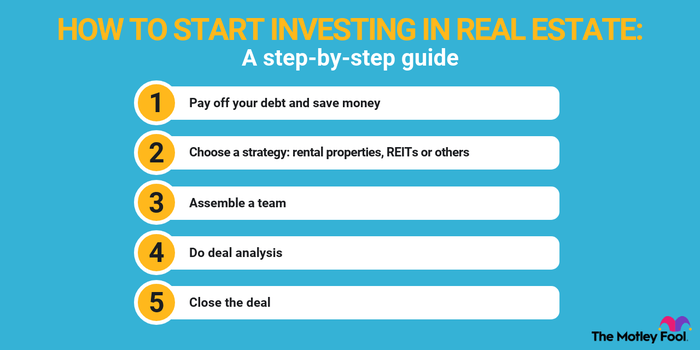Looking Real Estate Partner To Help Me To Invest My Money In Real Estate Investments
How to Invest in Real Estate: A Complete Guide
Updated: Nov. 8, 2021, 11:35 a.m.
Many investors have a real estate position in their portfolio. But adding other real estate investments can help you diversify your portfolio and protect you from stock market volatility. Let's take a look at your options for investing in real estate, the pros and cons, and how you can get started.
What are my investment options?
Here are the most popular real estate investment methods:
- Rental properties
- REITs
- Real estate investment groups
- Flipping houses
- Real estate limited partnerships
- Real estate mutual funds
Let's dive deeper into how these work.
Rental properties
Rental properties are the most hands-on option in this list. You buy a piece of residential real estate and rent it to tenants. Many rental properties are rented for 12-month periods, but shorter-term rentals through companies such as Airbnb (NASDAQ:ABNB) are becoming more popular as well.
As the property owner, you are the landlord. You're responsible for upkeep, cleaning between tenants, big repairs, and paying property taxes. Depending on the lease terms, you may be on the hook for replacing appliances and paying for utilities.
You make money off rental properties from the rental income you receive from tenants and price appreciation if you sell the property for more than you paid for it.
You can also benefit from tax write-offs. Under passive activity loss rules, you can deduct up to $25,000 of losses from your rental properties from your normal income if your modified adjusted gross income is $100,000 or less. Depreciation (a noncash expense) and interest (which you pay no matter what), could make the property show an accounting loss even when you're still making money.
When you buy rental property, you could need a down payment of up to 25%. But if you charge enough rent to cover your mortgage payment, you'll get the rest covered by your tenant, plus any price appreciation.
REITs
If you don't want to put up with the headache of managing a rental property or can't come up with the 25% down payment, real estate investment trusts (REITs) are an easy way to start investing in real estate. REITs are publicly traded trusts that own and manage rental properties. They can own anything: medical office space, malls, industrial real estate, and office or apartment buildings, to name a few.
REITs tend to have high dividend payments because they are required to pay out at least 90% of their net income to investors. If the REIT meets this requirement, it will not have to pay corporate taxes.
Additionally, while selling a rental property could take months and mountains of paperwork, a REIT has the advantage of liquidity since they trade on stock exchanges.
Real estate investment groups
Investing in a real estate investment group (REIG) is one way to keep the profit potential of private rental properties while possibly getting more upside than a REIT trading at a premium.
REIGs purchase and manage properties and then sell off parts of the property to investors. A REIG will buy something like an apartment building, and investors can buy units within it.
The operating company retains a portion of the rent and manages the property. This means the company finds new tenants and takes care of all maintenance. Oftentimes, the investors will also pool some of the rent to keep paying down debt and meet other obligations if some units are vacant.
Flipping houses
Flipping houses is the most difficult and risky of these options, but it can be the most profitable. The two most common ways to flip houses are to buy, repair, and sell, or buy, wait, and sell. In either case, the key is to limit your initial investment with a low down payment and keep renovation costs low.
Let's say you manage to buy a house for $250,000 with 20% down, or $50,000. You do another $50,000 of renovations and then list the house for $400,000. You use the $400,000 to pay off the $200,000 loan and then have $100,000 in profit on a $100,000 investment. It's a great return if you can get it.
The problem is that you usually can't. Housing markets aren't known for being volatile, but when they're being leveraged to the hilt -- as you have to be -- it kills you in the flipping houses game. Keeping renovation costs to a minimum may sound easy, but it may be nearly impossible if you don't have direct construction experience.
As of 2021, materials prices are through the roof, there are worker shortages everywhere, and almost no houses are for sale on the cheap. It's the worst possible part of the cycle for house-flippers: Everything is expensive, and the market could turn at any minute.
If you choose to flip houses, be smart and figure out a way to sit it out when the market gets too hot. It may seem counterintuitive, but it'll save you in the long run.
Real estate limited partnerships
Real estate limited partnerships (RELPs) are a form of REIG. RELPs are structured similarly to hedge funds, where there are limited partners (investors) and a general partner (the manager). The general partner is typically a real estate business that takes on all liability.
RELPs are a more passive investment in real estate. Typically, the general partner sets up the partnership and recruits investors to be limited partners. Investors then receive a K-1 to report income on their taxes, but they don't have much influence in operations.
RELPs can be very profitable if you find a good general partner. But you're relying totally on that general partner who must, without much oversight, manage the property and reliably report financials back to you.
Real estate mutual funds
Real estate funds invest in REITs and real estate operating companies (REOCs). REOCs are like REITs, but they don't have to pay dividends, so they grow much faster.
Real estate mutual funds or exchange-traded funds (ETFs) are the simplest ways to invest in real estate. You allow a manager or even an index to choose the best real estate investment while you collect dividends.
Even if you're a stocks-only investor, consider using real estate funds to get diversification while keeping the liquidity profile you're used to.

Source: Getty Images
Why should you invest in real estate?
Here are a few pros and cons of investing in real estate:
| Pros | Cons |
|---|---|
| If you invest in physical property, you can control your investment. You could also have a totally passive investment that you don't need to manage. | In a Great Recession type of event, prices can collapse and take down your entire portfolio. |
| Can be a source of steady monthly income payments. | With the amount of leverage required, even small price drops can wipe out your whole investment. |
| Can reduce your overall volatility through diversification and lower price movements in general. | If you choose to flip houses or personally own rental properties, it can turn into a career in itself and use up significant free time. |
| Can lead to long-term wealth through the use of leverage. | Up-front costs can make initial investments difficult. You need to save enough for the down payment and to cover cash flow shortages when there are vacancies. |
How to get started in real estate
If you choose to invest in real estate, follow these five steps to get started:
- Save money: Real estate has some of the most expensive barriers to entry of any of the asset classes. Before you get started, you'll want to pay off your high-interest debt and have significant savings.
- Choose a strategy: Each of the strategies listed above can be successful. If you choose to buy REITs or funds, you can use a website such as Millionacres to help you get started. If you want to buy physical property, you'll need to decide on a market.
- Assemble a team: You may want to work with an agent when you get started. Great agents will send you off-book opportunities that haven't been listed yet. Eventually, you could need someone to manage your properties and an accountant to handle the financials. If you become successful, you may eventually need investors, too.
- Do deal analysis: Whether you're investing in residential or commercial real estate, you should do plenty of research on any investment. For example, with rental properties, you'll need to analyze what future rent payments could be, what expenses you may be liable for, and forecast what you could sell the property for.
- Close the deal: The final step is pulling the trigger. Close on your property, or make the buy in your brokerage account.
Related investing topics
Investing in Construction Stocks
The construction industry encompasses infrastructure, industrial and buildings investment opportunities.
Investing in Housing Stocks
Housing stocks give you exposure to the industry without having to own a home.
Investing in Lumber Stocks
Lumber is one type of commodity stock within the construction industry.
Investing in Electric Utility Stocks
Electric utility stocks are publicly traded companies regulated by government agencies.
The bottom line
Real estate investing can seem intimidating at first. Not everyone has the time or ability to flip houses or handle having a tenant. The good news is there are options available for every level of investor, with each catering to different goals, skill levels, and time constraints. The most important thing to do is get started today and let your investment start compounding now.
Recent articles

Gladstone Land Corporation (LAND) Q3 2021 Earnings Call Transcript
LAND earnings call for the period ending September 30, 2021.
Motley Fool Transcribers | Nov 10, 2021

This Crowdfunding REIT Is Going Public in 2022
The non-traded REIT is moving to the public markets.
Matthew DiLallo | Nov 10, 2021

If You Invested $2,500 in Innovative Industrial Properties in 2019, This Is How Much You Would Have Today
You'd be making much more than if you had invested in an index fund.
Alex Carchidi | Nov 10, 2021

This Underrated Real Estate Stock Could Make You Richer
American Tower should benefit from several tailwinds in the years ahead.
Trevor Jennewine and Travis Hoium | Nov 9, 2021

CoreCivic, inc (CXW) Q3 2021 Earnings Call Transcript
CXW earnings call for the period ending September 30, 2021.
Motley Fool Transcribers | Nov 9, 2021

Why Shares of KE Holdings Are Rising Today
The company reported third-quarter earnings results, and an analyst weighed in on the company's outlook.
Bram Berkowitz | Nov 9, 2021

New York Office Market Still a Drag on SL Green
SL Green sees its tenants return to the office, despite the slow pace.
Brent Nyitray, CFA | Nov 9, 2021

Macerich's Comeback Takes Another Step Forward
Net operating income continues to recover, while the mall REIT is steadily reducing its debt load.
Adam Levine-Weinberg | Nov 9, 2021

This Self-Storage REIT Is Delivering Explosive Growth
The self-storage REIT delivered a monster quarter while adding more fuel to keep growing.
Matthew DiLallo | Nov 9, 2021

Got $10,000? Buy These 2 High-Yielding Dividend Stocks That Pay 5%
Although these yields may be high, they are safe.
David Jagielski | Nov 9, 2021
You Might Also Like
Looking Real Estate Partner To Help Me To Invest My Money In Real Estate Investments
Source: https://www.fool.com/investing/stock-market/market-sectors/real-estate-investing/
Posted by: browntherear68.blogspot.com

0 Response to "Looking Real Estate Partner To Help Me To Invest My Money In Real Estate Investments"
Post a Comment